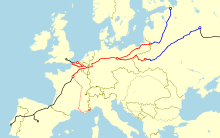Nord Express
The Nord Express (Northern Express) was a train service introduced in 1896 by the Compagnie Internationale des Wagons-Lits, which operated sleeping-cars, dining cars and trains deluxe all over Europe, including the Orient Express. It left Paris and travelled via Brussels, Cologne, Hanover, Berlin, Königsberg (now Kaliningrad) and Dvinsk (now Daugavpils) to Saint Petersburg.

The founders of CIWL wanted to establish a direct link between Saint Petersburg and Lisbon to connect with ocean liners to America.
Passengers from Russia had to change once in East Prussia at the German/Russian border because Russian railway tracks are of a wider gauge than those in Western Europe. In Paris there was a connecting service to the Sud Express (Southern Express) to Lisbon. This train service enabled people to travel across Europe in what was, by the standards of the time, a very fast and comfortable manner.
After World War I the train was diverted to Warsaw instead of Saint Petersburg. After World War II the "iron curtain" and air travel caused the end to this famous train.
Since World War II the name Nord Express has been used for the initially luxury and since 1951 ordinary night train between Paris and Copenhagen. In 2007 it was shortened further and diverted again such that it now runs between Paris and Hamburg, taking 10.5 hours.
In the arts
- Vladimir Nabokov describes in the seventh chapter of Speak, Memory how he traveled on the Nord Express from Saint Petersburg to France for a holiday in 1906.
- Alfred Hitchcock's movie Strangers on a Train (1951),[1] was translated to French as "L'inconnu du Nord-Express" (The unknown man in the Nord-Express).
- The animated 20th Century Fox movie, Anastasia (1997) mentioned that the train was traveling from Saint Petersburg to Paris, which was most likely referring to the Nord Express.
References
Notes
- "Strangers on a Train (1951)". Internet Movie Database. Retrieved 2008-03-05.
See also
- Famous trains